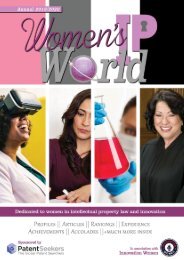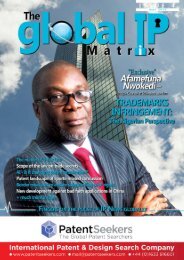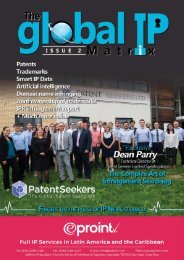Global IP Matrix - Issue 5
It has been a fantastic year for The Global IP Matrix magazine, thanks to all the efforts made by our contributors and to you, the reader for your continued support. We take great pleasure in putting together each issue of this publication, and we sincerely hope you enjoy this final issue of 2019. We have again, collaborated with some of the world's most influential IP law firms and businesses to bring you another eclectic mix of content, direct from the professionals working at ground level. We are already excited for the coming year and cannot wait to continue growing and evolving in our partnerships to bring you some exciting new features for 2020. Ms. Elvin Hassan Editor & Head of international liaisons
It has been a fantastic year for The Global IP Matrix magazine, thanks to all the efforts made by our contributors and to you, the reader for your continued support. We take great pleasure in putting together each issue of this publication, and we sincerely hope you enjoy this final issue of 2019. We have again, collaborated with some of the world's most influential IP law firms and businesses to bring you another eclectic mix of content, direct from the professionals working at ground level. We are already excited for the coming year and cannot wait to continue growing and evolving in our partnerships to bring you some exciting new features for 2020.
Ms. Elvin Hassan
Editor & Head of international liaisons
You also want an ePaper? Increase the reach of your titles
YUMPU automatically turns print PDFs into web optimized ePapers that Google loves.
Can a thorough search<br />
help you gain a granted patent?<br />
At Victor Green & Company, we<br />
provide a range of searches and pride<br />
ourselves on the quality of our reports.<br />
Three types of prior art search have<br />
been selected for a closer look; budget<br />
pre-filing/novelty, patentability, and<br />
validity. Each can affect the likelihood<br />
of reaching a strong granted patent.<br />
We analysed a sample of patents that<br />
had been opposed and considered the<br />
searches that may have been done by<br />
the assignees.<br />
The value of our reports is attested to<br />
in our testimonials, and we know that<br />
attorneys often reword their claims in<br />
the light of our novelty search reports.<br />
Types of search<br />
Atal, Akers, and Hantos have summarised the<br />
different types of search that may be required<br />
during the patent lifecycle [1-3]. These can<br />
be a ‘state of the art’ search conducted before<br />
research and development investment or a<br />
pre-filing novelty search conducted before<br />
applying for a patent. A further patentability<br />
search may be done before foreign filing,<br />
infringement searching before launch, and<br />
validity searching at the time of grant. The<br />
usefulness of our searches is described in our<br />
client testimonials [4].<br />
Patentability searches<br />
These assess the patentability of a new product<br />
or process and also look for all documents<br />
relevant to the novelty, or obviousness of an<br />
invention. This type of search is performed<br />
before filing or registration, or before seeking<br />
commercialisation. It can help a client decide<br />
how they should draft their patent claims or<br />
whether to file an application at all, thereby<br />
reducing unnecessary costs and delays in the<br />
filing process.<br />
by Victor Green, Alessio Brizzi, Davinia Collyer & Jo Shaw<br />
of Victor Green & Company www.victorgreen.co.uk<br />
Validity searches<br />
A validity search confirms whether a patent<br />
or design (either the client’s or a competitor’s)<br />
is valid with respect to the prior art. For<br />
patent validity, this may cover both patent<br />
and non-patent literature. If relevant previous<br />
documentation is found that was not located<br />
by the examiner, the patent has a greater<br />
chance of being revoked on the basis that it was<br />
incorrectly granted.<br />
Validity searches on competitors’ patents are<br />
therefore useful if the competitor is considering<br />
infringement proceedings. Alternatively,<br />
if a client wants to take legal action for a<br />
competitor’s infringement of a patent they<br />
own, or is approaching a company to arrange<br />
a licensing deal, a validity search may be<br />
required to decide if the patent in question is<br />
vulnerable to legal challenge.<br />
Analysis results for<br />
opposition set<br />
Oppositions to European patents have been<br />
described in two papers by van de Kuilen<br />
[5-6]. He found that the main reasons<br />
for revocation were lack of inventive step<br />
(accounting for 43% of revocations), lack of<br />
novelty (22%) or added subject matter (11%).<br />
We searched for European patents that had<br />
been opposed. The European jurisdiction<br />
was chosen due to the fact the European<br />
Patent Office (EPO) is rigorous in the way it<br />
classifies the source and relevance of citations,<br />
providing detailed legal status information.<br />
We limited the set to those that had been<br />
revoked, amended, or unchanged; the<br />
percentages were 31% revoked, 28% amended,<br />
and 41% unchanged.<br />
When a competent patentability or pre-filing<br />
search is done, the prior art identified puts<br />
the attorney in the best place to draft the<br />
specification. It can help the attorney fulfil<br />
the requirements of the patent application,<br />
e.g., demonstrate novelty and inventive step,<br />
and describe how the invention has addressed<br />
problem(s) in the prior art. It also provides<br />
sound preparation for the examination and<br />
any opposition that might be filed.<br />
(Fig.1) The legal status of opposed European patents to show<br />
proportion amended, revoked or unchanged<br />
10 www.gipmatrix.com












